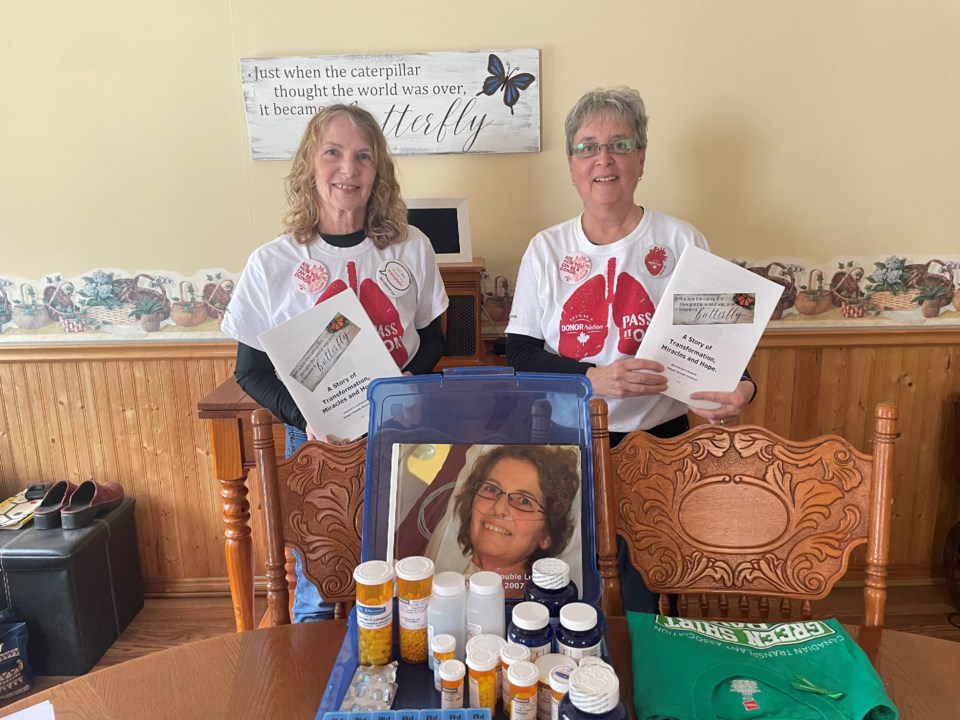For close to a decade, since her life saving double lung transplant surgery, Orillia resident Deanna Peacock has been advocating for people to become organ donors, and assisting those who are going through the organ transplant process.
Along with her friend and caregiver, Margot Crowder-Davidson, the pair have volunteered with Trillium Gift of Life and given talks and presentations around the province, and pushed for their goal of having 50 per cent of Orillians become organ donors.
When they began their work in 2013, only 23 per cent of Orillians were registered as organ donors, but that number has now risen to 41 per cent.
Peacock, who was diagnosed with idiopathic pulmonary fibrosis, had only three months to live when she got her life-saving surgery in 2012. She had spent years on a waiting list.
“(The organs) have to match your blood type. They have to match your tissue type. They have to match your size,” she said. “There's a whole lot of other criteria you have to match.”
Though the transplant process can save a person’s life, it is not a cure, Peacock said, as there can be a multitude of medications a survivor needs to take, and there is always the threat that a recipient’s body could reject the transplant.
That is part of the reason Peacock and Crowder-Davidson began working with people going through, or thinking of going through the transplant process.
In order to receive an organ transplant, a recipient must have a caregiver to help them through the process.
“My primary role with Deanna was social and emotional support,” Crowder-Davidson said. “To deal with looking at the end of life, this is big stuff, right? How do you do that? And how do you get through the fear of daily feeling like you're losing your life?"
Peacock and Crowder-Davidson have been diligently working with transplant recipients, and connecting people with caregivers, for a number of years.
Peacock stressed the importance of being able to talk with someone who understands, and the two have begun working with potential caregivers to help them develop a deeper understanding of the transplant’s effects on recipients.
Peacock said she had an organ donation recipient available to her when she was going through the process.
“When I was going through that part of the journey before transplant, I really wanted to speak to somebody that had been through it, right? How can I go through this supposedly life-giving procedure and not talk to somebody that's already been through it?” she said.
(The recipient I talked to) gave me some wonderful ideas - you know, try not to wear oxygen at your son's wedding, because the pictures will be there for life,” Peacock said. "Well, I would never have thought of that - those types of really personal questions.”
Those experiences are a big motivator for the work she does now.
“I'm on the phone, hours every day, talking to probably five people in Orillia right now, that either have just had or that are going for (organ transplants),” she said. “Out of that has grown the fact that caregivers need the same type of advice, same type of support, same type of conversation.”
ORGAN DONATION FACTS:
- One organ and tissue donor can save up to eight lives and enrich as many as 75.
- About 1,500 people in Ontario are on a waiting list for a transplant. Every three days, someone dies while waiting for a life-saving organ transplant.
- Everyone has the potential to be an organ and/or tissue donor regardless of age or health.
- The first and foremost duty of health-care professionals is to save a life. Only when a life cannot be saved does organ and tissue donation become an option.
For more information about organ donation, visit the website.



